|
|
|
Sort Order |
|
|
|
Items / Page
|
|
|
|
|
|
|
| Srl | Item |
| 1 |
ID:
137374
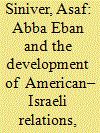

|
|
|
|
|
| Summary/Abstract |
Abba Eban, Israel’s ambassador in Washington and representative at the United Nations from 1950 to 1959, had a central role in the transformation of American–Israeli relations during a period of frequent discord over key strategic issues. This analysis examines the influence of one prominent actor upon bilateral ties that would eventually become the American–Israeli “special relationship.” Eban’s oratory talent, linguistic skills, and effective style of diplomacy augmented both Israel’s image in the view of the American public and relations with official Washington. The article explores several critical elements of these relations during the 1950s, re-examining both Eban’s involvement in events such as Israel’s approach toward the problem of borders, its policy of military retaliation, and the response to severe American pressure following the 1956 Sinai campaign. Whilst not attributing the development of close relations between the two Powers solely to the works of a single individual, evidence suggests that Eban was the right man in the right place and time to provide the necessary foundations for the elevation of American–Israeli relations to “special” in the following decade.
|
|
|
|
|
|
|
|
|
|
|
|
|
|
|
|
| 2 |
ID:
137376
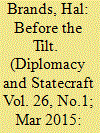

|
|
|
|
|
| Summary/Abstract |
Scholars have detailed the American “tilt” toward Iraq during the 1980s. There is, however, an important pre-history to this relationship, which has only emerged with the release of new American and Iraqi documents. American overtures to Saddam Hussein originated not under Reagan, but under his predecessor. From early in his presidency, Jimmy Carter sought to engage Iraq in hopes of moderating the Baathist regime and fortifying America’s position in the Persian Gulf and broader Middle East. Though this diplomacy ultimately proved unsuccessful, this episode has implications for the study of Carter’s foreign policy and the evolution of American–Iraqi relations.
|
|
|
|
|
|
|
|
|
|
|
|
|
|
|
|
| 3 |
ID:
137371
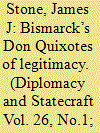

|
|
|
|
|
| Summary/Abstract |
Otto von Bismarck is often seen as the classic “great man” in history who single-handedly united Germany through his ruthless application of Realpolitik. This focus on his apparently unchallenged and unprincipled conduct of foreign policy has tended to overshadow the significant contributions made by his collaborators to this success and the importance of conservative ideology as a factor in the conduct of diplomacy during the Bismarck era. A closer look at the careers of the two most important German ambassadors during the early Imperial period reveals the important role they played in Bismarck’s foreign policy triumphs. Heinrich VII Prince Reuss and General Hans Lothar von Schweinitz were not only the most influential German diplomats of that age, their commitment to conservative/legitimist principles made them at times the harshest critics and most dangerous rivals of their leader. What has until now been entirely overlooked is how closely they worked with one another to pursue a course in international affairs that did not always align with official policy and their instructions from Berlin. Their partnership and collaboration from 1871–1892 in working to preserve the existing social and political order in Eastern and Central Europe was unique in both its effectiveness and duration, although it was ultimately unsuccessful in achieving its ambitious goal of preserving the political and social status quo in Europe. This analysis explores the often volatile relationship of these men to Bismarck, their personal and professional alliance, and the conservative agenda they attempted to promote jointly as ambassadors to Vienna and St. Petersburg for over two decades.
|
|
|
|
|
|
|
|
|
|
|
|
|
|
|
|
| 4 |
ID:
137372
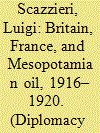

|
|
|
|
|
| Summary/Abstract |
This analysis centres on British and French policies concerning Mesopotamian oil between 1916 and 1920. Both Powers already had some degree of interest in oil matters before the war, but these concerns did not leave a particularly strong imprint on the Sykes-Picot Agreement of 1916. During the First World War, both Britain and France became aware of their lack of oil and identified Mesopotamian oil as a key war aim. Both Powers developed close relations with Royal Dutch-Shell to further their oil policies. After the war, the struggle for oil proved inseparable from the territorial settlement in the Middle East and relations with oil companies. All actors did not initially recognise this fact, and it was only during 1919–1920 that an increasing awareness developed that oil and territorial issues were inseparable. Combined with changes in political leadership, it made possible a “silent compromise” at San Remo in April 1920.
|
|
|
|
|
|
|
|
|
|
|
|
|
|
|
|
| 5 |
ID:
137378
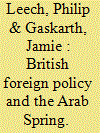

|
|
|
|
|
| Summary/Abstract |
The British government’s varied responses to the popular uprisings of the “Arab Spring” have been criticised for being inconsistent and/or selective. British actions ranged from providing substantial military support for the rebels in Libya to offering notably muted reactions to government suppression of protests in Bahrain. On assuming office, the new foreign secretary, William Hague, suggested that Britain would have a networked approach to foreign policy with a greater awareness of the bilateral interests that Britain had with other countries around the world. This analysis offers a provisional examination of the security, economic, and societal networks that Britain holds with states in the Arab world and, in doing so, tests whether these have any correlation with the British government’s policy towards protests in the region.
|
|
|
|
|
|
|
|
|
|
|
|
|
|
|
|
| 6 |
ID:
137375


|
|
|
|
|
| Summary/Abstract |
In 1968, the newly appointed World Bank president, Robert McNamara, asked former Canadian Prime Minister Lester B. Pearson to chair a Bank Commission on International Development in hopes that he could revive the North’s flagging commitment to foreign aid promised under the banner of the Decade of Development. The Commission and its Report—Partners in Development—have a general reputation as farsighted approaches to problems of official development assistance. In Canada, the Pearson Commission is viewed through the lens of Canada’s commitment to Middle Power multilateralism. This analysis tests both interpretations by examining the Commission and the conception and reception of its work. Whilst the Middle Power concept circumscribed Pearson’s role and effectiveness, the Commission succeeded in helping Canada’s chief ally, the United States, share the burden of development assistance with its European allies. As in the realm of peacekeeping, Pearsonian development diplomacy was as much about shoring up relations with Northern allies as it was with developing new Southern friendships.
|
|
|
|
|
|
|
|
|
|
|
|
|
|
|
|
| 7 |
ID:
137373


|
|
|
|
|
| Summary/Abstract |
This analysis draws lessons about the failure of Wilsonian Pan–Americanism from an examination of the American occupation of Chiriquí, Panama, an event long neglected by historians. It argues that the Woodrow Wilson Administration missed an opportunity to demonstrate to Panamanians, and Latin Americans more generally, the benefits to be gained by accepting its tutelage and leadership in inter-American affairs. Rather than collaborate with a sympathetic Liberal regime in Panama City, Washington embarked on a unilateral mission to re-make a part of Panama in its image. The result was a surge of nationalist resistance that threatened the overthrow of the government in Panama City and hastened the end of the occupation. Chiriquí is representative of American efforts in the region before the 1930s and helps to explain Wilson’s failure to build a “new world order” in the Western Hemisphere.
|
|
|
|
|
|
|
|
|
|
|
|
|
|
|
|
| 8 |
ID:
137377
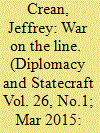

|
|
|
|
|
| Summary/Abstract |
President George H.W. Bush’s use of personal diplomacy has been a frequently noted but little studied subject in the scholarly literature. For the first time, this analysis examines the transcripts of telephone conversations between Bush and foreign leaders during Operation Desert Shield and Operation Desert Storm to determine the nature and purpose of these communications. Bush used these conversations more to build relationships than to persuade. He valued the contributions of the French president, François Mitterrand, over those of the British prime minister, Margaret Thatcher, and the assistance provided by the Turkish president, Turgut Özal, over that of the Egyptian president, Hosni Mubarak. The tensions of crisis and war did not bring Bush and Saudi Arabia’s King Fahd closer together, and a rupture occurred in his previously close relationship with Jordan’s King Hussein. In this process, public opinion in the United States and abroad remained of paramount concern.
|
|
|
|
|
|
|
|
|
|
|
|
|
|
|
|
|
|
|
|
|